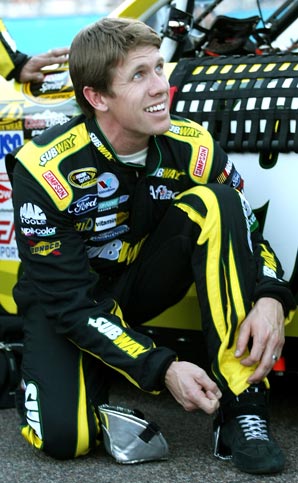Constructing NASCAR's perfect driver
"Carl Edwards is probably the closest thing to having the total package that we have right now," Waltrip said. "He's pretty aggressive, but he's very smart, but he also kind of knows how to run a race backwards. Carl, in my mind, is the prototype driver you're looking for.
"Kyle Busch is more aggressive than Carl. Jeff Burton and Mark Martin might even be more patient than Carl. Carl might lack a little bit in that area, but when it comes to be smart and knowing what to do and how to relate to your crew, I think he's pretty good at that as well. If I had to put it all down from every driver, I think you end up with Carl in a lot of places."
But Edwards is only nearly perfect. With the help of some other informed observers, we construct the perfect NASCAR driver -- the kind that doesn't and hasn't ever existed. Using components from the drivers of today, we're pulling the most important traits (everything from racing IQ to conditioning) and building our NASCAR Frankenstein one piece at a time.
Filtering constant streams of data, harnessing or quashing emotion, assessing a chess board whose pieces move at 150 mph: it's no easy task. Jeff Gordon is the master, which is why he's won four Sprint Cup titles (only Dale Earnhardt and Richard Petty have more, with seven), has 82 wins (sixth-best all-time) and leads the standings again.
"Jeff knows when [to race hard]," said Ray Evernham, who won three titles as Gordon's crew chief. "He's smart. He knows when to be aggressive. He knows when to sit back, when to pass. He's got an information base built up that he analyzes. Jeff used to analyze his race three laps ahead of time. He was constantly positioning himself."
And why not? He has 50 wins in NASCAR's top three series (15 in Cup) by age 24. His confidence borders on brashness (perhaps on the far side of the border), but again, why not? He backs it up.
Six-packs used to mean beer in NASCAR parlance, but he's trying to change all that.
No, seriously. His ability to exert his will on other cars on the race track, but cajole their drivers afterwards over a hand of poker or a bass boat is Earnhardt-esque.
The three-time defending series champion is a master of the Chase for the Championship format. That was never more clear than in 2007, when he won four of the last five races of the season to pass and seemingly demoralize teammate Gordon.
He returned from semi-retirement at age 50 because he says he loves the sport so much -- not, he insists, to try again for that elusive first championship -- and has agreed to return to Hendrick Motorsports No. 5 Chevrolet full-time next season. Meanwhile, he's won twice in 11 races this year -- his best season since winning twice in all of 1999 -- and has become a very popular title contender. The level of respect he commands from fans and his peers borders on reverence.
He left the Indy Racing League last year as the most successful American open-wheel driver of his generation, a winner of a record 19 races and three championships. In a stock car, he was woeful, apparently lost, eroding his legacy ... until recently. Hornish sudden seems revitalized. Instead of begging team owner Roger Penske to return to the IRL, he quietly persevered, worked harder and is improving.
No NASCAR driver uses his institutional knowledge and senses to better maneuver a stock car around a track. He makes something out of nothing even when the something is not there.
"A good driver drives by the seat of his pants," Waltrip said. "You've got a lot of feel in your butt. And the other part is you have to use your senses: you hear it, you smell it, you feel it -- if you smell a gear burning up or you feel something or hear the engine change sounds. If you're out their or you're in tune with your job, all those things are going to come into play."
No driver commands a room like Junior, and none seems as compelled to occasionally share their innermost reflections on a complicated life with a room full of strangers.
It's not really a burnout, but a backwards victory lap, and there should be an injunction issued to keep him from calling it the "Unwind Lap," fan vote or not. But Busch's post-Atlanta moonwalk -- there's a name, "Moonwalk!" -- around the track was an instant classic.
Ozzie Smith became a slave to the backflip, and maybe someday Edwards will, too, when the back is not so much chiseled as achy. For now, though, his leap off his door is NASCAR's most impressive celebration, especially after a rigorous few hours in a race car.
It's all part of that total package.





